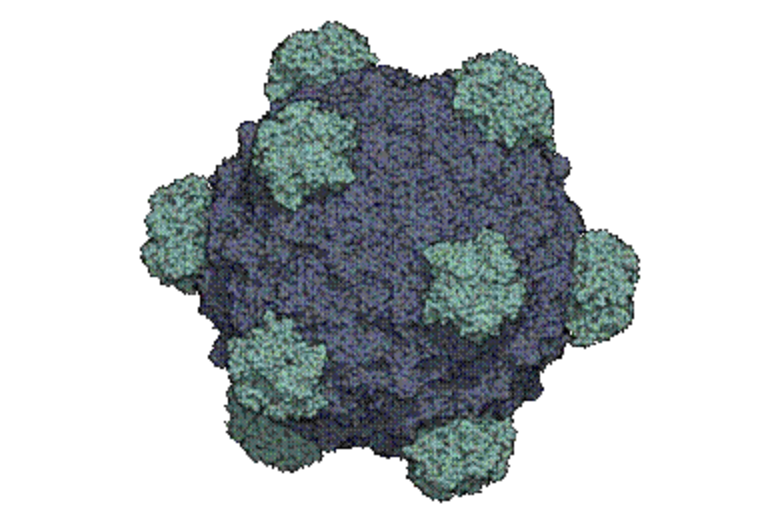Insider Brief
- The Sanger Institute selected Quantinuum as a technology partner in their Wellcome Leap Quantum for Bio (Q4Bio) challenge bid, which is funding global research to apply quantum computing to genomics to overcome computational limits that persist even after 25 years of progress since the Human Genome Project.
- The consortium, led by the University of Oxford, with partners including the Wellcome Sanger Institute and Quantinuum, is developing quantum algorithms to process complex and variable genomes beyond the reach of classical computers.
- The consortium’s near-term mission is to encode and process the PhiX174 genome on a quantum computer, which would mark a world-first demonstration of quantum computing’s practical use in biology.
- Bacteriophage PhiX174, published under a Creative Commons License https://commons.wikimedia.org/wiki/File:Phi_X_174.png
PRESS RELEASE — Twenty-five years ago, scientists accomplished a task likened to a biological moonshot: the sequencing of the entire human genome.
The Human Genome Project revealed a complete human blueprint comprising around 3 billion base pairs, the chemical building blocks of DNA. It led to breakthrough medical treatments, scientific discoveries, and a new understanding of the biological functions of our body.
Thanks to technological advances in the quarter-century since, what took 13 years and cost $2.7 billion then can now be done in under 12 minutes for a few hundred dollars. Improved instruments such as next-generation sequencers and a better understanding of the human genome – including the availability of a “reference genome” – have aided progress, alongside enormous advances in algorithms and computing power.

But even today, some genomic challenges remain so complex that they stretch beyond the capabilities of the most powerful classical computers operating in isolation. This has sparked a bold search for new computational paradigms, and in particular, quantum computing.
Quantum Challenge: Accepted
The Wellcome Leap Quantum for Bio (Q4Bio) challenge is pioneering this new frontier. The program funds research to develop quantum algorithms that can overcome current computational bottlenecks. It aims to test the classical boundaries of computational genetics in the next 3-5 years.
One consortium – led by the University of Oxford and supported by prestigious partners including the Wellcome Sanger Institute, the Universities of Cambridge, Melbourne, and Kyiv Academic University – is taking a leading role.
“The overall goal of the team’s project is to perform a range of genomic processing tasks for the most complex and variable genomes and sequences – a task that can go beyond the capabilities of current classical computers” – Wellcome Sanger Institute press release, July 2025
Selecting Quantinuum
Earlier this year, the Sanger Institute selected Quantinuum as a technology partner in their bid to succeed in the Q4Bio challenge.
Our flagship quantum computer, System H2, has for many years led the field of commercially available systems for qubit fidelity and consistently holds the global record for Quantum Volume, currently benchmarked at 8,388,608 (223).
In this collaboration, the scientific research team can take advantage of Quantinuum’s full stack approach to technology development, including hardware, software, and deep expertise in quantum algorithm development.
“We were honored to be selected by the Sanger Institute to partner in tackling some of the most complex challenges in genomics. By bringing the world’s highest performing quantum computers to this collaboration, we will help the team push the limits of genomics research with quantum algorithms and open new possibilities for health and medical science.” – Rajeeb Hazra, President and CEO of Quantinuum
Quantum for Biology
At the heart of this endeavor, the consortium has announced a bold central mission for the coming year: to encode and process an entire genome using a quantum computer. This achievement would be a potential world-first and provide evidence for quantum computing’s readiness for tackling real-world use cases.
Their chosen genome, the bacteriophage PhiX174, carries symbolic weight, as its sequencing earned Fred Sanger his second Nobel Prize for Chemistry in 1980. Successfully encoding this genome quantum mechanically would represent a significant milestone for both genomics and quantum computing.
Sooner than many expect, quantum computing may play an essential role in tackling genomic challenges at the very frontier of human health. The Sanger Institute and Quantinuum’s partnership reminds us that we may soon reach an important step forward in human health research – one that could change medicine and computational biology as dramatically as the original Human Genome Project did a quarter-century ago.
“Quantum computational biology has long inspired us at Quantinuum, as it has the potential to transform global health and empower people everywhere to lead longer, healthier, and more dignified lives.” – Ilyas Khan, Founder and Chief Product Officer of Quantinuum
Glossary of terms: understanding how quantum computing supports complex genomic research
| Term | Definition |
| Algorithms | A set of rules or processes for performing calculations or solving computational problems. |
| Classical computing | Computing technology based on binary information storage (bits represented as 0 or 1). |
| DNA sequence | The exact order of nucleotides (A, T, C, G) within a DNA molecule. |
| Genome | The complete set of genetic material (DNA) present in an organism. |
| Graph-based genome (Sequence graph) | A non-linear network representation of genomic sequences capturing the diversity and relationships among multiple genomes. |
| High Performance Compute (HPC) | Advanced classical computing systems designed for handling computationally intensive tasks, simulations, and data processing. |
| Pangenome | A collection of multiple genome sequences representing genetic diversity within a population or species. |
| Precision medicine | Tailored medical treatments based on individual genetic, environmental, and lifestyle factors. |
| Quantinuum | The world’s largest quantum computing company, Quantinuum systems lead the world for the rigorous Quantum Volume benchmark and were the first to offer commercial access to highly reliable “Level 2 – resilient” quantum computing |
| Quantum bit (Qubit) | Basic unit of quantum information, which unlike classical bits, can exist in multiple states simultaneously (superposition). |
| Quantum computing | Computing approach using quantum-mechanical phenomena (e.g., superposition, entanglement, interference) for enhanced problem-solving capabilities. |
| Quantum Pangenomics | Interdisciplinary field combining quantum computing with genomics to address computational challenges in analyzing genetic data and pangenomes. |
| Quantum Volume | A specific test of a quantum computer’s performance on complex circuits. The higher the quantum volume the more powerful the system. Quantinuum’s 56-qubit System Model H2 achieved a record quantum volume of 8,388,608 in May 2025. |
| Quantum superposition | A fundamental quantum phenomenon in which particles can simultaneously exist in multiple states, enabling complex computational tasks. |
| Sequence mapping | Determining how sequences align or correspond within a larger genomic reference or graph. |
| Wellcome LeapQuantum for Bio (Q4Bio) | Initiative funding research combining quantum computing and biological sciences to address computational challenges. |
| Wellcome SangerInstitute | The Sanger Institute tackles some of the most difficult challenges in genomic research. |















